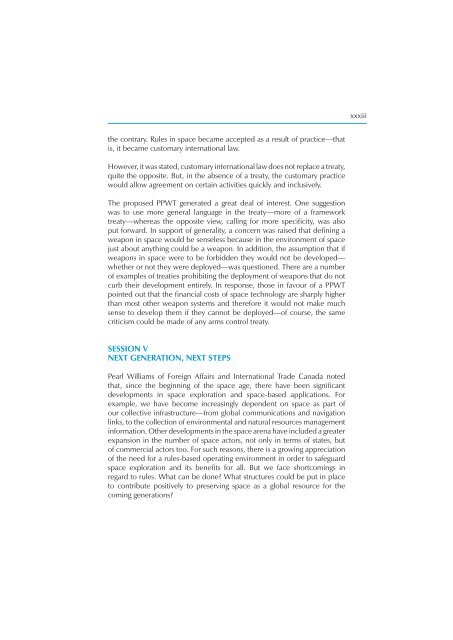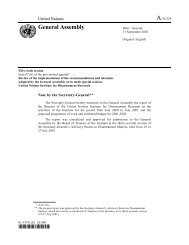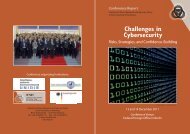Security in Space The Next Generation - UNIDIR
Security in Space The Next Generation - UNIDIR
Security in Space The Next Generation - UNIDIR
Create successful ePaper yourself
Turn your PDF publications into a flip-book with our unique Google optimized e-Paper software.
the contrary. Rules <strong>in</strong> space became accepted as a result of practice—that<br />
is, it became customary <strong>in</strong>ternational law.<br />
However, it was stated, customary <strong>in</strong>ternational law does not replace a treaty,<br />
quite the opposite. But, <strong>in</strong> the absence of a treaty, the customary practice<br />
would allow agreement on certa<strong>in</strong> activities quickly and <strong>in</strong>clusively.<br />
<strong>The</strong> proposed PPWT generated a great deal of <strong>in</strong>terest. One suggestion<br />
was to use more general language <strong>in</strong> the treaty—more of a framework<br />
treaty—whereas the opposite view, call<strong>in</strong>g for more specifi city, was also<br />
put forward. In support of generality, a concern was raised that defi n<strong>in</strong>g a<br />
weapon <strong>in</strong> space would be senseless because <strong>in</strong> the environment of space<br />
just about anyth<strong>in</strong>g could be a weapon. In addition, the assumption that if<br />
weapons <strong>in</strong> space were to be forbidden they would not be developed—<br />
whether or not they were deployed—was questioned. <strong>The</strong>re are a number<br />
of examples of treaties prohibit<strong>in</strong>g the deployment of weapons that do not<br />
curb their development entirely. In response, those <strong>in</strong> favour of a PPWT<br />
po<strong>in</strong>ted out that the fi nancial costs of space technology are sharply higher<br />
than most other weapon systems and therefore it would not make much<br />
sense to develop them if they cannot be deployed—of course, the same<br />
criticism could be made of any arms control treaty.<br />
SESSION V<br />
NEXT GENERATION, NEXT STEPS<br />
Pearl Williams of Foreign Affairs and International Trade Canada noted<br />
that, s<strong>in</strong>ce the beg<strong>in</strong>n<strong>in</strong>g of the space age, there have been signifi cant<br />
developments <strong>in</strong> space exploration and space-based applications. For<br />
example, we have become <strong>in</strong>creas<strong>in</strong>gly dependent on space as part of<br />
our collective <strong>in</strong>frastructure—from global communications and navigation<br />
l<strong>in</strong>ks, to the collection of environmental and natural resources management<br />
<strong>in</strong>formation. Other developments <strong>in</strong> the space arena have <strong>in</strong>cluded a greater<br />
expansion <strong>in</strong> the number of space actors, not only <strong>in</strong> terms of states, but<br />
of commercial actors too. For such reasons, there is a grow<strong>in</strong>g appreciation<br />
of the need for a rules-based operat<strong>in</strong>g environment <strong>in</strong> order to safeguard<br />
space exploration and its benefi ts for all. But we face shortcom<strong>in</strong>gs <strong>in</strong><br />
regard to rules. What can be done? What structures could be put <strong>in</strong> place<br />
to contribute positively to preserv<strong>in</strong>g space as a global resource for the<br />
com<strong>in</strong>g generations?<br />
xxxiii








